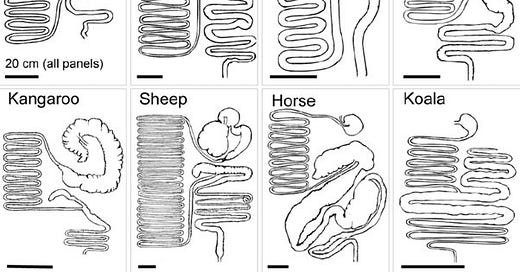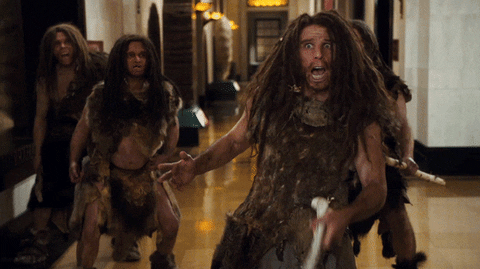Why is it that humans can’t eat raw meat? It’s a good question because you’d think that if humans are really at the top of the food chain, they’d evolve with the most efficient digestive system on the planet.
Well, with evolution, it’s always a complex question of trade-offs.
First, it is true that humans can eat raw meat. But if you were to compare our digestive system to other animals, there are some notable differences that suggest this is not what it was optimized to do.
First, a notable difference from above is just how much more simple our system is. It’s very basic. Not only are the structures different, but even within the primate family, there are notable differences in structural size of the colon and intestine. Certain intestines above, like that of the sheep, are incredibly long, enabling them to extract nutrients from the grasses they eat. They also have a large stomach which is home to a large population of micro-organisms that include bacteria, protozoa, and fungi. There are also differences in the types of bacteria and acids in their stomach that allow certain animals, such as the kangaroo, to better absorb nutrients and break down cellulose.
Keep reading below to learn more.
Even within the primate family, humans are unique. Take a look at the organ sizes of different primates - including humans - below. One striking difference is just how much bigger our small intestine is relative to other apes, as well as how much smaller our colon is.
Primate digestive systems evolved to eat mostly vegetarian with a bit of meat. Gorillas, for instance, mainly eat stems, bamboo shoots, and fruits, as well as some small insects such as termites and ants - all raw. Chimps eat mostly fruits, berries, leaves, and seeds, but also sometimes eat eggs, chicks, and insects - also all raw. They are able to do this because their large colon is so big that it stores lots of microbes that can digest cellulose efficiently and convert it to energy. This makes it easier for primates to digest large amounts of fiber and break it down. This, in turn, is why monkeys will eat bananas whole without peeling them.
Note, however, that this badass ability comes with a cost: a larger colon requires more calories to maintain. Calories that take away from other valuable organs in your body … like your brain.
And sometime in our evolutionary history, we were pushed out of the comfortable fruit-picking, chimp/ape habitat and thrown into a region where food supplies couldn’t just be plucked out of trees. This may have occurred due to any number of factors, but climate change was likely a contributing factor. The eastern areas of Africa suddenly became drier, reducing the amount of forest land available, but then also increasing the surface area of the savanna and all the big-game animals roaming on top of it.
And so suddenly, we had a lot fewer fruits and small meats in front of us. BUT, we had huge calorie packets that were running around on the plains and savannas, each with their own set of complex behavior that needed to be outwitted.
And in this new environment, the size of your gut became a hindrance. A large hut was difficult to haul around chasing such huge animals for long distances, so smaller guts were selected for. Also in this new environment, humans had to run down large animals over long distances and push them into heatstroke, so having smaller muscles but greater muscular endurance was selected. Finally - and perhaps most important - having a bigger brain was also selected for, because hunting large animals required complex coordination and communication skills to complete a successful hunt.

However, smaller guts meant fewer bacteria and acids for digesting raw stuff. Smaller guts meant humans had to do a lot of their digesting work before it hit their mouths. And so early humans noted in their hot, dry environment - prone to forest fires - that burnt animal flesh actually solved many of their problems. It essentially took the digesting process and externalized it outside the body. It broke down the meat and kills off bacteria all without needing to haul around a massive gut.
It also has a by-product of forcing humans to work together. Hunting game successfully with slow and relatively weak bodies such as ours requires another skill linked to brain development: communication and coordination. These skills also evolved as our gut size shrunk.
Cooking food and brain size / complexity seems to be correlated. There is growing evidence that other forms of intelligent life on earth - Neanderthals, Denisovons, etc - seemed to have cooked their meat as well. Cooked meat may have been a precondition for intelligence. And there is growing evidence, too, that human DNA linked to liver gene expression has been selected for via cooking.
The linkage between meat-eating and brain size can be seen quite clearly in this graph from this article.

Note evolutionary science is constantly changing and learning new things, so some of this information may be proven wrong in the future.
I’ve also glossed over a number of details, but you can find more information here.
Sources:
Pobiner, B. (2013) Evidence for Meat-Eating by Early Humans. Nature Education Knowledge 4(6):1. [link]
Babbitt, C. C., Warner, L. R., Fedrigo, O., Wall, C. E., & Wray, G. A. (2011). Genomic signatures of diet-related shifts during human origins. Proceedings. Biological sciences, 278(1708), 961–969. https://doi.org/10.1098/rspb.2010.2433 [link]
The American Journal of Clinical Nutrition, Volume 71, Issue 3, March 2000, Pages 665–667, Hunter-gatherer diets—a different perspective








